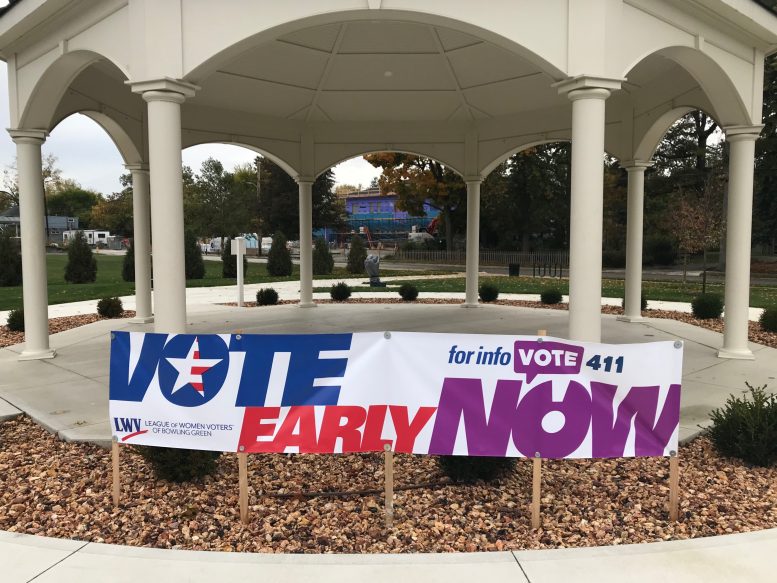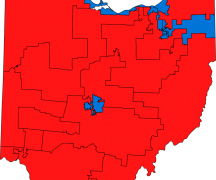Republicans in the Ohio House of Representatives proposed sweeping voting restrictions last week that would impose new hurdles for voters to register and cast a ballot.
The legislation, if passed, would require voters to present state issued photo identification to register, eliminate no-excuse absentee voting, prohibit the use of ballot drop boxes and more.
House Bill 387, sponsored by Rep. Bill Dean, R-Xenia, marks Republicans’ latest foray into making voting more difficult on the heels of former president Donald Trump’s repeated lie that his opponent won the presidency only by way of fraud. The proposed bill has six other Republican members signed on as cosponsors.
Other House Republicans introduced a comparatively more limited bill restricting voting laws in May. HB 387 is “far more extreme,” according to Camille Wimbish, election administration director for voter advocacy group Ohio Voice.
“It certainly is frightening,” she said. “It includes a whole host of extreme provisions, and that will take Ohio backward.”
Some of the key changes:
- Absentee voting: Current law allows any Ohio voter to obtain an absentee ballot to mail in for any reason. HB 387 would only allow this if a voter is disabled, ill or meets other narrow exceptions. It also blocks the Secretary of State from its practice of mailing absentee ballot applications to all voters.
- Voter identification: Current law allows Ohioans to use either a driver’s license, utility bill, bank statement, military ID or paycheck as voter identification at the polls. HB 387 would only allow state-issued photo identification, with exemptions for people with religious objections to being photographed.
- Drop boxes: Prohibits boards of elections from processing and counting any ballots returned to a drop box, usually sited outside a county board of elections. Some voters used them in the 2020 election to avoid crowded precincts amid a COVID-19 surge occurring at the time.
- Voter machines: Blocks elections officials from approving or certifying voting machines unless they’re made in the U.S.; open up their “object code” and “source code” to public inspection; use blockchain technology along with paper ballots; and are not connected to the internet.
“All these things are hurtful restrictions that are seeking to overhaul our elections in ways that are harmful to voters,” Wimbish said.
Dean did not respond to an interview request to discuss the contents of the 168-page bill or his motivations for seeking the changes.
Rob Nichols, a spokesman for the Ohio Secretary of State’s office, largely declined comment but said Secretary Frank LaRose prefers the more limited legislation to the bill introduced last week.
“We support [HB] 294,” he said.
Between Jan. 1 and July 14, at least 18 states have enacted 30 laws restricting access to vote, according to an analysis from the Brennan Center for Justice. More than 400 bills with provisions that restrict voting access have been introduced in 49 states this year.
Some of the new laws make mail voting and early voting more difficult, toughen voter ID requirements, and more.
There is no evidence of systematic voter fraud in the United States. Rare instances of fraud arise, though they represent extremely small shares of total votes cast.
For instance, about 5.9 million Ohioans voted in 2020. Just 13 people illegally cast a ballot, LaRose said last month. Just over 100 people illegally registered to vote, he said, though some of these cases involved “honest mistakes.”
While voter fraud is rare, Republicans’ belief in its widespread existence is common, public opinion polling shows. June polling from Monmouth University found 63% of Republicans believe President Joe Biden won only because of voter fraud.
At least one cosponsor of the bill, Rep. Scott Wiggam, R-Wooster, posted various, baseless claims of election fraud on social media after Biden’s win.
***
Also from Ohio Capital Journal:
Redistricting: Education funding hangs in balance with unbalanced districts
The redrawing of legislative maps has an impact on where you go to vote and who to call at the Ohio Statehouse, but it also determines the support students get when they go to school, and what teachers can and can’t do in their classrooms. So say members of teachers unions and education advocates across the state as the process of redistricting continues.
“When you repress opportunity in public schools, you are repressing equal opportunity in society,” said Susie Kaeser, lead education specialist for the Ohio chapter of the League of Women Voters.
With redrawn districts that provide better representation for both sides of the political and ideological aisle, Ohio Federation of Teachers president Melissa Cropper said the state can be more informed on how school districts are doing and what their needs are.
The impact of legislative representation is felt at the budgetary level in education’s funding haul from the state, but also in the education policies enacted by the General Assembly. READ MORE
Opponents of sports betting bill say it won’t protect consumers, will worsen wealth inequality
Opponents of the sports betting bill the Ohio Senate approved earlier this summer said the bill doesn’t include proper consumer protections and stands to worsen Ohio’s wealth inequality.
National Director of Stop Predatory Gambling Les Bernal said that the commercialization of sports betting and online gambling would not be in the public interest during a Tuesday press conference, calling commercialized gambling a form of “consumer financial fraud” unlike any other business, including those involving vices like tobacco and alcohol.
“Citizens are conned into thinking that they can win money on games that are designed to get them fleeced … it’s offering the lure that you might get money,” Bernal said. “Inevitably, you lose your money in the end, especially if you keep gambling. Any success only comes at someone else’s expense.”
Senate Bill 176, approved by the Senate in June, would create three separate sportsbook licenses, allowing Ohioans to place bets online, at professional sports arenas and a select few bars and restaurants. Under this plan, sports betting would be overseen by the Ohio Casino Control Commission, and the state would collect a 10% tax on net revenue, with nearly all of the proceeds going to K-12 education and the rest going to problem gambling services. State Sen. Theresa Gavarone, R-Bowling Green, is a co-sponsor of the bill. READ MORE





